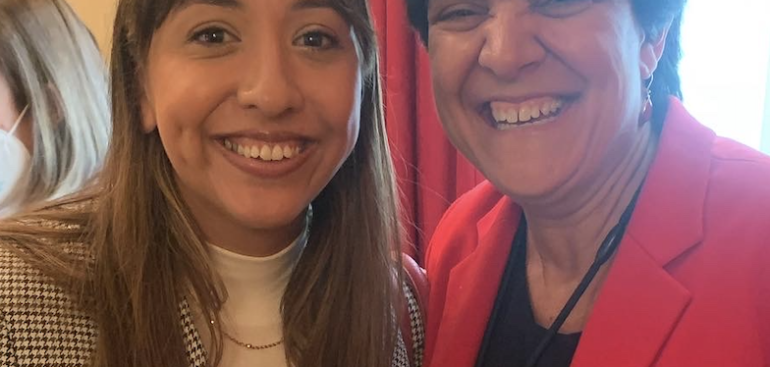By Yasmin Campos-Mendez, MSW
I was honored to attend a special ceremony at the White House on March 16th, the day after President Biden signed into law the Violence Against Women Act of 2022. This passage has been a long time coming as the reauthorization process began in 2016, and the VAWA expired in October of 2018. I arrived and was greeted by White House staff at every gate entrance I walked past. I looked over to my left and saw Senator Feinstein, who is a Senate leader on VAWA, getting out of a car with some of her staff and security. Upon entering the White House, I was captivated by live music and the beautiful art on the walls that led to the VAWA ceremony.
I saw so many familiar faces that I’ve only ever seen on a Zoom screen before. I greeted and congratulated colleagues and then found a seat. I felt my knees shaking from joy and anticipation. As I looked around the room I saw the Senate Majority Leader Chuck Schumer, Majority Leader of the United States House of Representatives Steny Hoyer, long-standing domestic violence champion Congresswoman Debbie Dingell, and many more members of Congress. And I also got to see so many of my colleagues from the National Task Force to End Sexual and Domestic Violence for the very first time in person.
President Biden walked in with Ruth M. Glenn, the CEO/President of the National Coalition Against Domestic Violence, and kicked us off. Ruth gave a powerful and moving speech on the importance of passing this legislation and the work we still have ahead in protecting all survivors. President Biden then spoke about the history and growth of the VAWA bill, “It really wasn’t so long ago this country didn’t want to talk about violence against women, let alone as being a national epidemic, something the government had to address.” He thanked advocates, victims, and survivors, plus members of the House and Senate who worked hard to pass this bill.
The President humbly spoke about how the government did not always get it right since VAWA was passed in 1994, and how we must keep working to make the bill even better. It was chilling when the President spoke about what it used to be like for many survivors before there were confidential domestic violence hotlines connecting survivors to support and shelter: “Women would hide and say, ‘I can’t — I can’t say where I am. I — I don’t know. Help me. Help me.’”
The whole ceremony was moving and brought lots of emotion, but what moved me the most as a public policy advocate, was when President Biden said “ The law kept growing stronger. It’s not like we didn’t know in 2005 we should be dealing with the things we dealt with in 2013. It was getting it done. Each link in the chain that we’re building made a difference — makes a difference.” That is how working in public policy feels a lot of the time! We may not have everything we asked for in this VAWA reauthorization, but it is an improvement. And as President Biden stated in his remarks, “The reason we’ve been able to do so much, make so much progress…. is because of all of you.”
This is a day I will never forget because, after years of on the ground advocacy with survivors of domestic violence, I finally got to celebrate a win with lawmakers, their staff, and other advocates. It took time to get VAWA reauthorized, and advocates, victims, and survivors did that. And they didn’t just change the law, the nudged the culture along too.
President Biden provided these remarks as he emphasized how important and life-saving VAWA funds are for victims and survivors of domestic violence, sexual assault, and human trafficking. If you would like to learn more about this law, check out the VAWA fact sheet that was released by the White House last week. We still have a long road ahead, but this victory certainly charges my passion for advocacy for Latin@ survivors.
